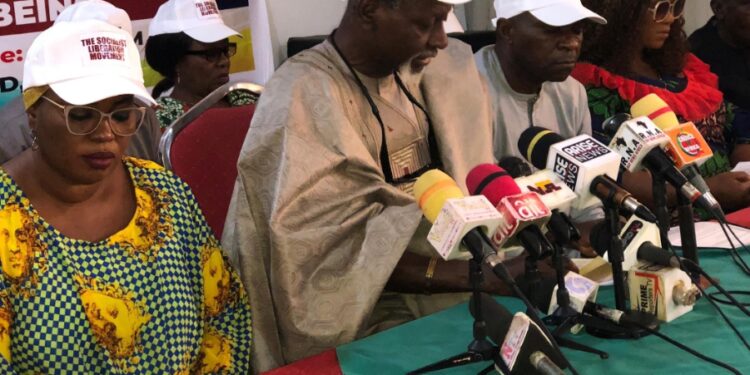The Socialist Liberation Movement (SLM), a coalition of 100 civil society organizations, has expressed its support for the economic policies of the Bola Tinubu administration, noting that these initiatives are beginning to positively impact the lives of everyday Nigerians.
Speaking at a press conference in Abuja on Monday, the movement’s convener, Dr. Agabi Emmanuel, commended the administration’s proactive approach to addressing Nigeria’s economic challenges.
Dr. Emmanuel highlighted key policies such as the removal of fuel subsidies and the floating of the naira, which he said have shown promise in restoring confidence in the nation’s economy.
The establishment of the Presidential Economic Coordination Council (PECC) and the Economic Management Team Emergency Taskforce (EET) also received praise for strengthening Nigeria’s economic governance structures.
According to the SLM, the administration’s commitment to infrastructure development, including roads, railways, and energy projects, is commendable. These efforts, implemented through public-private partnerships, are expected to reduce transportation costs and improve access to markets across the country.
Dr. Emmanuel also acknowledged significant strides in advancing Nigeria’s digital economy. Initiatives such as the Digital Nigeria program, which focuses on broadband expansion and supporting tech startups, were lauded for driving innovation, boosting financial inclusion, and creating new job opportunities.
The Tinubu administration’s emphasis on agricultural transformation was another key point of praise. Programs like the Food Security and Agricultural Mechanization Programme and the National Agriculture Growth Scheme-Agro-pocket have been identified as having the potential to increase food production and reduce dependence on imports.
Overall, the SLM emphasized that these economic policies and initiatives are beginning to yield tangible benefits for ordinary citizens, signaling a brighter future for Nigeria’s economy.
“After an extensive scrutiny of some of the policies introduced by the present administration, It was observed that President Bola Tinubu has taken steps to restore confidence in the economy by reducing inflation, stabilizing the foreign exchange market, and improving fiscal management,” the statement added.
“He has also invested in infrastructure development, such as roads, railways, and energy projects, to support economic growth,”the statement said.
“President Bola Tinubu’s administration is prioritizing the digital economy, driving innovation and financial inclusion through initiatives like the Digital Nigeria program. This flagship program aims to enhance digital literacy, employability, and economic growth, while boosting GDP, entrepreneurship, and job creation.
“By investing in digital technology, empowering small businesses, and creating opportunities across sectors, President Tinubu seeks to leverage digital transformation to reduce poverty and improve living standards.
“With commitments to training three million youths in digital technology and creating one million new tech jobs, the administration is poised to unlock Nigeria’s digital potential and drive sustainable economic growth.
“The Bola Tinubu administration has implemented transformative initiatives to boost Nigeria’s agricultural sector, prioritizing food security and economic growth. Notably, the Food Security and Agricultural Mechanization Programme aims to enhance food production and reduce import reliance.
“Additionally, the National Agriculture Growth Scheme-Agro-pocket provides training, certified inputs, and subsidized irrigation equipment to millions of farmers, increasing productivity and incomes.
“President Tinubu’s declaration of a state of emergency in the agriculture sector underscores the administration’s commitment to addressing sectoral challenges, while initiatives like the Green Imperative Programme and partnerships with international organizations further demonstrate the government’s dedication to transforming Nigeria’s agricultural landscape.
“President Bola Tinubu’s administration has introduced transformative policies to revitalize Nigeria’s health sector, demonstrating a commitment to improving healthcare outcomes and increasing access to quality services.
“Key initiatives include the Health Sector Renewal Investment Initiative, which has mobilized $2.2 billion in external financing, and the redesigned Basic Health Care Provision Fund (BHCPF) to enhance access to essential healthcare services.
“Additionally, the National Health Insurance Authority Act (NHIAA) aims to achieve Universal Health Coverage (UHC) by mandating health insurance for all Nigerians, while programs like the National Health Fellows Programme and prioritized domestic health financing further underscore the administration’s dedication to strengthening Nigeria’s healthcare system.
“In the educational sector, President Bola Tinubu has introduced several education policies aimed at transforming Nigeria’s education sector. One notable initiative is the “#WeAreEqual” campaign, which promotes inclusive education, skill development, and gender equity.
“The government has also approved four new education policies, including the creation of a data repository, out-of-school children education, teacher training and development, and skill development and acquisition.
“Additionally, President Tinubu has launched the Student’s Loan scheme to ensure that every eligible child gets quality higher education in Nigeria with the overarching objective to improve education outcomes, increase access to quality education, and promoting gender equity in the education sector.
“President Bola Tinubu’s budget policy prioritizes national defense and internal security, job creation, macro-economic stability, investment environment optimization, human capital development, poverty reduction, and social security. Key initiatives include overhauling the internal security architecture, and promoting public-private partnerships to leverage private capital for infrastructure projects.
“In our considered opinion, President Bola Tinubu has embarked on a promising trajectory towards translating our hopes and aspirations into tangible realities, demonstrating a commitment to transformative governance and economic development.
“By implementing bold economic reforms, investing in critical sectors, and prioritizing the welfare and prosperity of citizens, the administration has shown determination to create a better Nigeria for this generation and the generation unborn.“
The Socialist Liberation Movement, therefore, called on Nigerians to support the administration’s efforts, acknowledging the challenges and criticisms while maintaining a constructive dialogue.











